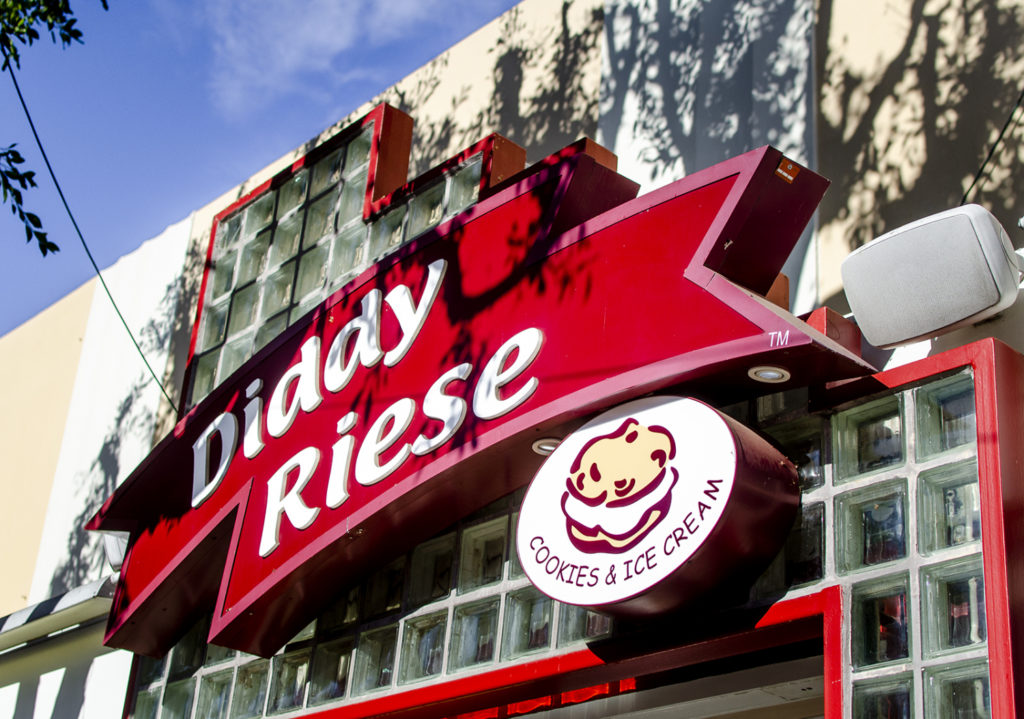Digging into Westwood’s food scene, from mom and pop shops to big businesses

(Nghi Nguyen/Daily Bruin)
By Alicia Park
March 4, 2024 6:55 p.m.
This post was updated on March 7 at 8:17 p.m.
UCLA’s college town of Westwood is home to almost 100 different startups offering one thing: food.
Ingrid Teng, a fourth-year cognitive science student, said she has grown an affinity for the diversity of food in Westwood through growing her food-based Instagram account, where she showcases some of Westwood’s food businesses.
“Westwood is very diverse in terms of food offerings,” Teng said. “(It) just reminds me of a really homey place where you could literally find any type of cuisine.”
Behind the scenes of the many Westwood restaurants Bruins may visit are various entrepreneurs who work to operate and grow their startups. From mom and pop shops like Diddy Riese to publicly traded corporations such as Sweetgreen or private franchises like Egg Tuck, Westwood’s restaurant ecosystem contains a range of business narratives.
Assistant professor of strategy at the UCLA Anderson School of Management Jane Wu said startups can be organized into two categories: small-medium businesses and high-growth, or venture-backed, enterprises.
Cookie and ice cream store Diddy Riese is an example of an SMB, which Wu said is jargon meant to explain an entrepreneur’s motivations.
“There’s a whole group of entrepreneurs that form businesses, primarily with the focus of supporting the lifestyle of themselves or their families and growing. But growth is not the first order, obsession or focus of this type of business,” Wu said.
According to UCLA Newsroom, Diddy Riese has been an iconic store in Westwood since the 1980s, with lines currently as long as 20 minutes. Despite its popularity and growth over the years, Diddy Riese has chosen to stay a mom and pop shop – rather than pursuing high growth through increasing the number of stores – to prevent increases in prices and decreases in quality, according to LA Weekly.

Other restaurant owners also focus on priorities other than growth.
Alex Sohn, the founder of breakfast shop Egg Tuck and several other restaurants in Los Angeles, said he prioritizes customers, as he believes that new restaurant ideas and good results will follow.
“Rather than actually planning concepts, I love actually being on the floor, interacting with customers, getting their feedback,” Sohn said.
While the entrepreneurs behind Diddy Riese and Egg Tuck may be focused on goals outside of high growth, various entrepreneurs’ high-growth-oriented mindsets have led to the establishment of other restaurants in Westwood.
Major franchises such as salad chain Sweetgreen and dessert store Insomnia Cookies are a few examples of high-growth-oriented startups or venture-backed enterprises, which Wu said is the more typical conception of startups today.
Sweetgreen, a restaurant chain founded by three college students from Georgetown University in 2007, was the first-ever salad startup to reach unicorn status – meaning a valuation of $1 billion – according to CNBC. Major institutional investors as well as individual investors made returns on their million-dollar investments when Sweetgreen went public via the New York Stock Exchange on Nov. 18, 2021 with a valuation of $5.5 billion, according to Pitchbook and CNBC. Such investors included Fidelity Investments, the founder of GroupMe and tennis player Naomi Osaka.
Just a few blocks away from Sweetgreen’s Westwood location, Insomnia Cookies follows a similar business narrative. Founded in the dorm room of University of Pennsylvania student Seth Berkowitz in 2003, Insomnia Cookies started off as a college hobby and became a high-growth startup that obtained funding from venture capital firm Mistral Equity Partners before Krispy Kreme acquired a majority stake in the company in 2018, according to Pitchbook.
Growth-oriented startups often get their start through investments from external investors like venture capitalists in return for fulfilling the promise of providing high returns for early investors, according to Forbes. Wu said high-growth startup entrepreneurs may therefore make decisions that prioritize their investors’ interests, which involves maximizing the possible returns on their investments.
Wu added that entrepreneurs may maximize returns for their investors by taking their company public or selling their company to a larger corporation. These processes, whereby investors can sell their stakes in the startup, allow for investors to cash out on their investment, according to the U.S. Securities and Exchange Commission.
On the other hand, Wu said SMB entrepreneurs who may not receive external funding may individually finance their ventures by taking on debt through bank loans or with their personal savings accounts. Wu added that there are pros and cons to both of these approaches that entrepreneurs need to consider, which is a question Noam Wasserman raises in his book “The Founder’s Dilemmas.”
“Sometimes it’s about power, … being able to do what you want with that business,” Wu said in reference to Wasserman’s book. “And other times it’s about relaxing some of that, letting that go so that hopefully you can have a smaller piece of a bigger pie.”
While SMB owners maintain relatively more control over business decisions because they have a larger financial stake in their business, entrepreneurs of high-growth startups may have to concede some control to investors who have major stakes in their business through their significant financial contributions, according to the University of Minnesota.
No matter the motivations and subsequent operational strategies of entrepreneurs in Westwood’s food ecosystem, Sohn said Westwood’s perks and challenges make it a unique space for entrepreneurs to navigate.
Sohn said his idea to bring Egg Tuck to Westwood was because he liked the high energy found near a college campus. Having been in the food industry for 20 years and having managed seven restaurants in LA, Sohn said his Westwood Egg Tuck venture has brought about new business challenges such as college students’ different consumer behavior.
For Bruins like Teng, restaurants in Westwood are primarily an outlet for their social lives, whereas cooking at home may be a more financially sound decision most days.
“If I’m eating (by) myself, I tend to cook at home or (go) grocery shopping,” Teng said. “But if I’m hanging out with a group of friends or just catching up with people or hanging out with people from a club, I tend to go to restaurants in Westwood.”
Because Westwood is a college town, Sohn said there were initial difficulties in adapting to the seasonality of businesses, with UCLA students and staff leaving for extended periods of time during major holidays and breaks. Additionally, Sohn said the effective development and management of his employees is a continuous challenge he faces across all of his restaurant ventures.
Despite these hurdles, Sohn said he continues to do this work because he finds it rewarding to impact people’s daily lives and help shape the local culture through food.
For Teng, who has amassed over 3,000 followers on her account, food allows her to expand her exposure to different cultures and create memories with loved ones.
“Food … brings me together with other people because I mostly eat with family and friends,” Teng said. “It definitely has a certain element of happy memories.”






